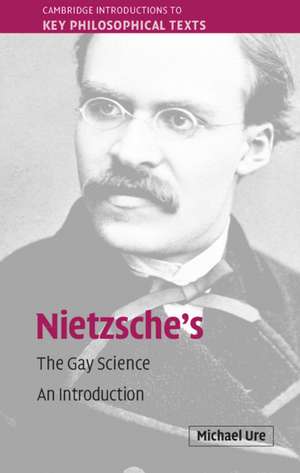Nietzsche's The Gay Science: An Introduction: Cambridge Introductions to Key Philosophical Texts
Autor Michael Ureen Limba Engleză Paperback – 22 mai 2019
| Toate formatele și edițiile | Preț | Express |
|---|---|---|
| Paperback (1) | 191.70 lei 3-5 săpt. | +12.23 lei 7-11 zile |
| Cambridge University Press – 22 mai 2019 | 191.70 lei 3-5 săpt. | +12.23 lei 7-11 zile |
| Hardback (1) | 498.47 lei 38-44 zile | |
| Cambridge University Press – 22 mai 2019 | 498.47 lei 38-44 zile |
Preț: 191.70 lei
Nou
Puncte Express: 288
Preț estimativ în valută:
36.68€ • 38.30$ • 30.29£
36.68€ • 38.30$ • 30.29£
Carte disponibilă
Livrare economică 25 martie-08 aprilie
Livrare express 11-15 martie pentru 22.22 lei
Preluare comenzi: 021 569.72.76
Specificații
ISBN-13: 9780521144834
ISBN-10: 0521144833
Pagini: 282
Dimensiuni: 138 x 216 x 15 mm
Greutate: 0.32 kg
Editura: Cambridge University Press
Colecția Cambridge University Press
Seria Cambridge Introductions to Key Philosophical Texts
Locul publicării:Cambridge, United Kingdom
ISBN-10: 0521144833
Pagini: 282
Dimensiuni: 138 x 216 x 15 mm
Greutate: 0.32 kg
Editura: Cambridge University Press
Colecția Cambridge University Press
Seria Cambridge Introductions to Key Philosophical Texts
Locul publicării:Cambridge, United Kingdom
Cuprins
Introduction; 1. Nietzsche's tragicomedy; 2. Nietzsche's new nobility: book one; 3. Redeeming art: book two; 4. Shadows of God: book three; 5. Sanctus Januarius: book four; 6. Eternal recurrence: personal infinity; 7. Dionysian pessimism: book five; 8. Nietzsche's Saturnalia: 1886 preface.
Recenzii
'Michael Ure's new book is a timely and assured contribution to Nietzsche scholarship. It makes a persuasive case for The Gay Science to be recognised as a key philosophical text, which revives an ancient conception of philosophy as a way of life and the philosopher as physician. Ure writes very well, and the whole makes for a very rich interpretation.' Duncan Large, University of East Anglia
'Ure's crisp writing is both penetrating and remarkably clear, making the book suitable for an introductory commentary (now this reviewer's top choice) as well as a worthy scholarly read for all ranges of readers of Nietzsche … Highly recommended.' D. P. Prianti, Choice
'Michael Ure's introduction to Friedrich Nietzsche's The Gay Science is a welcome contribution to the secondary literature. He provides a clear and coherent account of this complex text and situates his interpretation within Nietzsche's larger oeuvre and philosophical project. Ure advances an original thesis - GS is Nietzsche's attempt to revive an ancient understanding of philosophy as a way of life - that will be of interest to scholars more generally, and yet he still succeeds in introducing the text to the novice reader … the best introduction to GS currently available in the English language.' Journal of Nietzsche Studies
'[Michael Ure's] readings of individual aphorisms, especially when they concern aesthetics and the influence of Schopenhauer and Wagner on Nietzsche, are often lucid and penetrating. The book will serve as a fine introductory guide to advanced undergraduates and graduate students, and is an interesting contribution in its own right to the scholarly work on The Gay Science.' Journal of the History of Philosophy
'The interpretations proposed are original and convincing, well supported, and the book overall undoubtedly provides the reader with a better, more subtle and grounded, understanding of Gay Science.' Stéphanie Martens, Focault Studies
'Ure's crisp writing is both penetrating and remarkably clear, making the book suitable for an introductory commentary (now this reviewer's top choice) as well as a worthy scholarly read for all ranges of readers of Nietzsche … Highly recommended.' D. P. Prianti, Choice
'Michael Ure's introduction to Friedrich Nietzsche's The Gay Science is a welcome contribution to the secondary literature. He provides a clear and coherent account of this complex text and situates his interpretation within Nietzsche's larger oeuvre and philosophical project. Ure advances an original thesis - GS is Nietzsche's attempt to revive an ancient understanding of philosophy as a way of life - that will be of interest to scholars more generally, and yet he still succeeds in introducing the text to the novice reader … the best introduction to GS currently available in the English language.' Journal of Nietzsche Studies
'[Michael Ure's] readings of individual aphorisms, especially when they concern aesthetics and the influence of Schopenhauer and Wagner on Nietzsche, are often lucid and penetrating. The book will serve as a fine introductory guide to advanced undergraduates and graduate students, and is an interesting contribution in its own right to the scholarly work on The Gay Science.' Journal of the History of Philosophy
'The interpretations proposed are original and convincing, well supported, and the book overall undoubtedly provides the reader with a better, more subtle and grounded, understanding of Gay Science.' Stéphanie Martens, Focault Studies
Notă biografică
Descriere
Shows how Nietzsche's pivotal work The Gay Science formulates his three key concepts: the death of God, eternal recurrence and self-fashioning.















